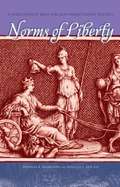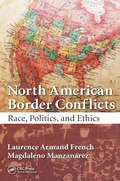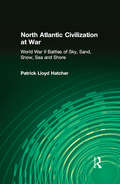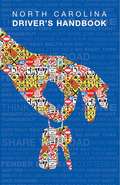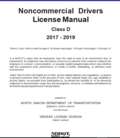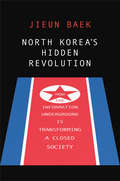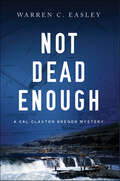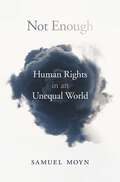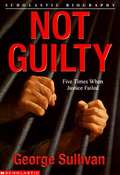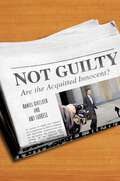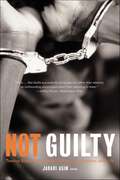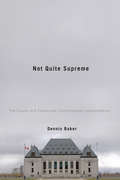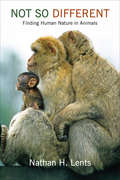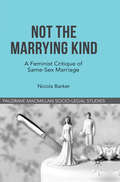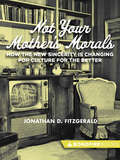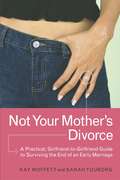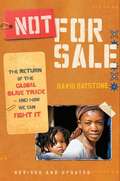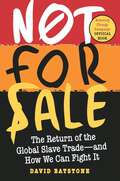- Table View
- List View
Norms of Liberty: A Perfectionist Basis for Non-perfectionist Politics
by Douglas B. Rasmussen Douglas J. Den UylHow can we establish a political/legal order that in principle does not require the human flourishing of any person or group to be given structured preference over that of any other? Addressing this question as the central problem of political philosophy, Norms of Liberty offers a new conceptual foundation for political liberalism that takes protecting liberty, understood in terms of individual negative rights, as the primary aim of the political/legal order. Rasmussen and Den Uyl argue for construing individual rights as metanormative principles, directly tied to politics, that are used to establish the political/legal conditions under which full moral conduct can take place. These they distinguish from normative principles, used to provide guidance for moral conduct within the ambit of normative ethics. This crucial distinction allows them to develop liberalism as a metanormative theory, not a guide for moral conduct. The moral universe need not be minimized or morality grounded in sentiment or contracts to support liberalism, they show. Rather, liberalism can be supported, and many of its internal tensions avoided, with an ethical framework of Aristotelian inspiration-one that understands human flourishing to be an objective, inclusive, individualized, agent-relative, social, and self-directed activity.
North American Border Conflicts: Race, Politics, and Ethics
by Laurence Armand French Magdaleno ManzanarezNorth American Border Conflicts: Race, Politics, and Ethics adds to the current discussion on class, race, ethnic, and sectarian divides, not only within the United States but throughout the Americas in general. The book explores the phenomenon of border challenges throughout the world, particularly the current increase in population migration in the America, Europe, Asia, the Middle East, and Africa, which has been linked to human trafficking and many other causes of human suffering. North American Border Conflicts takes students through the rich, sad history of border conflict on this continent.
North Atlantic Civilization at War: World War II Battles of Sky, Sand, Snow, Sea and Shore
by Patrick Lloyd HatcherThis book recounts the World War II journeys of a soldier, a ship, and a bottle of spirits through, and around, five great turning-point battles. Those battles were influenced more by geography and climate than by generals and admirals. Properly titled they would be known as the Battles of the Sky (Britain), the Sand (El Alemein), the Snow (Stalingrad), the Sea (North Atlantic), and the Shore (Normandy). Slogging their way through this quintet are an eighteen-year-old G.I. from Missouri (as seen through his letters home), an "ugly duckling" of a Liberty ship (as seen through its Armed Guard reports), and a bottle of rum (as traced by those who, after the war, made money in selling war souvenirs). It is the history of the North Atlantic sea basin and its extensions at war: the story of the lulls between battles, when America's teenage warriors often watched war movies (Humphrey Bogart made and Warner Brothers released seven during the war), sang or listened to popular tunes by songsmiths like Irving Berlin, and drank rum-and-Coke (while listening to Dick Haymes sing the hit "Rum & Coca-Cola"). While accessible and vastly entertaining, this is a serious work of history. By treating World War II in Europe much as Fernand Braudel treated the origins of Western civilization in his masterpiece The Mediterranean and the Mediterranean World in the Age of Philip II, Hatcher brings Braudelian detachment to his narrative.
North Carolina Driver's Handbook
by North Carolina Department of Transportation Division of Motor VehiclesThis handbook was written to help prepare you for the driver license examination. It offers valuable safe driving techniques which will help keep you out of harm's way. If you need additional assistance, contact your nearest driver license office or go online to: www.ncdot.gov/dmv
North Dakota Noncommercial Drivers License Manual: Class D 2017-2019
by North Dakota Department of Transportation Drivers License DivisionThe manual is designed as a basic reference for all drivers, and should be used to prepare for the written driver’s examination. It does not include some of the information needed to qualify for driving passenger buses, school buses, motorcycles, and heavy trucks. Such additional in- formation is contained in separate manuals available at all driver license offices.
North Korea's Hidden Revolution: How the Information Underground Is Transforming a Closed Society
by Jieun Baek&“A crisp, dramatic examination of how technology and human ingenuity are undermining North Korea&’s secretive dictatorship.&”—Kirkus Reviews One of the least understood countries in the world, North Korea has long been known for its repressive regime. Yet it is far from being an impenetrable black box. Media flows covertly into the country, and fault lines are appearing in the government&’s sealed informational borders. Drawing on deeply personal interviews with North Korean defectors from all walks of life, ranging from propaganda artists to diplomats, Jieun Baek tells the story of North Korea&’s information underground—the network of citizens who take extraordinary risks by circulating illicit content such as foreign films, television shows, soap operas, books, and encyclopedias. By fostering an awareness of life outside North Korea and enhancing cultural knowledge, the materials these citizens disseminate are affecting the social and political consciousness of a people, as well as their everyday lives. &“A fine primer on the country, based on extensive interviews with defectors.&”—Times Literary Supplement &“A fascinating book.&”—The New York Times &“[A] timely and cogent book.&”—Los Angeles Review of Books &“A fascinating and intelligent overview of the ways that information is liberating North Koreans&’ minds.&”—Robert S. Boynton, author of The Invitation-Only Zone: The True Story of North Korea's Abduction Project &“A fascinating, important, and vivid account of how unofficial information is increasingly seeping into the North and chipping away at the regime&’s myths—and hence its control of North Korean society.&”—Sue Mi Terry, former CIA analyst and senior research scholar at the Weatherhead East Asia Institute, Columbia University
North Korea, International Law and the Dual Crises: Narrative and Constructive Engagement
by Morse TanThe Democratic People's Republic of Korea (DPRK) has a reputation as one of the worst human rights situations in the world. This book utilizes a unique international law perspective to examine the actions and inactions of North Korea with regard to international security and human rights. Adopting political, military, historical and legal perspectives, the book explores how the two issues of nuclear weapons and the human rights abuses in North Korea are interconnected, and why the international community should apply the same international law framework to find a solution for both. Drawing on eyewitness accounts, such as refugee and defector testimony, Morse Tan offers a real-life story of North Korea that covers the pertinent law, and constructive approaches of its regime. Tan examines the specific objectives and actions of the North Korean government, and measures these according to international legal obligations such as applicable treaty law, jus cogens norms, and customary international law. The book concludes by offering solutions for dealing with international security surrounding the Korean Peninsula, and forwards a proposal for the creation of a tribunal to prosecute those at the top of the regime for international crimes and human rights abuses. As a project exploring the extremes of international law violation, this book will be of great interest and use to readers interested in the history, and political and legal implications of the strategies employed by the North Korea government.
North Korean Conundrum, The: Human Rights and Nuclear Security
by Robert R. King and Gi-Wook ShinNorth Korea is consistently identified as one of the world's worst human rights abusers. However, the issue of human rights in North Korea is a complex one, intertwined with issues like life in the North Korean police state, inter-Korean relations, denuclearization, access to information in the North, and international cooperation, to name a few. There are likewise multiple actors involved, including the two Korean governments, the United States, the United Nations, South Korea NGOs, and global human rights organizations. While North Korea's nuclear weapons and the security threat it poses have occupied the center stage and eclipsed other issues in recent years, human rights remain important to U.S. policy. The contributors to The North Korean Conundrum explore how dealing with the issue of human rights is shaped and affected by the political issues with which it is so entwined. Sections discuss the role of the United Nations; how North Koreans' limited access to information is part of the problem, and how this is changing; the relationship between human rights and denuclearization; and North Korean human rights in comparative perspective.
Not Dead Enough: A Cal Claxton Oregon Mystery (Cal Claxton Mysteries #4)
by Warren C Easley"Masterfully crafted... stunningly beautiful descriptions..." —Anne Hillerman, New York Times bestselling authorThe first closing of the floodgates of the mammoth Dalles Dam on the Columbia River inundated the sacred falls and the Native American village at Celilo which depended on the river's magnificent fish. Nelson Queah, Wasco Indian, war hero, and passionate opponent of the dam, watched helplessly as 10,000 years of tribal history and fishing tradition disappeared. That 1957 night, Nelson Queah vanished without a trace.Fifty years later, attorney Cal Claxton, new to Portland after a career as a prosecutor in Los Angeles, attends a commemoration of the flooding of the falls at the behest of his friend, Philip Lone Deer, who introduces Cal to his cousin, Winona Cloud. Winona is Nelson Queah's granddaughter. Spurning the story of a witness at the time who claimed to have seen Queah drunk by the river, she reveals she's found a cache of letters at her grandmother's home, letters Queah wrote to his wife before he vanished. They suggest foul play, and not an accidental drowning.Cal, still grieving over his own wife's suicide, agrees to check out the cold case. He locates the man who put out the drunk story and sets up an interview. When he arrives, he finds the man shot by a sniper. Cal gets a glimpse of the shooter and becomes a target himself.
Not Enough: Human Rights in an Unequal World
by Samuel MoynThe age of human rights has been kindest to the rich. Even as state violations of political rights garnered unprecedented attention due to human rights campaigns, a commitment to material equality disappeared. In its place, market fundamentalism has emerged as the dominant force in national and global economies. In this provocative book, Samuel Moyn analyzes how and why we chose to make human rights our highest ideals while simultaneously neglecting the demands of a broader social and economic justice. In a pioneering history of rights stretching back to the Bible, Not Enough charts how twentieth-century welfare states, concerned about both abject poverty and soaring wealth, resolved to fulfill their citizens’ most basic needs without forgetting to contain how much the rich could tower over the rest. In the wake of two world wars and the collapse of empires, new states tried to take welfare beyond its original European and American homelands and went so far as to challenge inequality on a global scale. But their plans were foiled as a neoliberal faith in markets triumphed instead. Moyn places the career of the human rights movement in relation to this disturbing shift from the egalitarian politics of yesterday to the neoliberal globalization of today. Exploring why the rise of human rights has occurred alongside enduring and exploding inequality, and why activists came to seek remedies for indigence without challenging wealth, Not Enough calls for more ambitious ideals and movements to achieve a humane and equitable world.
Not Fit for Our Society: Nativism and Immigration
by Peter SchragSchrag provides essential background for understanding the fractious debate over immigration. Covering the earliest days of the Republic to current events, Schrag sets the modern immigration controversy within the context of three centuries of debate over the same questions about who exactly is fit for citizenship.
Not Guilty
by George SullivanHistory shows that in the nation's justice system, innocent people were wrongly convicted of a serious crime occasionally. This book presents such historical cases that sadly show that justice is not always served.
Not Guilty: Are the Acquitted Innocent?
by Daniel Givelber Amy FarrellAs scores of death row inmates are exonerated by DNA evidence and innocence commissions are set up across the country, conviction of the innocent has become a well-recognized problem. But our justice system makes both kinds of errors—we acquit the guilty and convict the innocent—and exploring the reasons why people are acquitted can help us to evaluate the efficiency and fairness of our criminal justice system. Not Guilty provides a sustained examination and analysis of the factors that lead juries to find defendants “not guilty,” as well as the connection between those factors and the possibility of factual innocence, examining why some criminal trials result in not guilty verdicts and what those verdicts suggest about the accuracy of our criminal process.
Not Guilty: Twelve Black Men Speak Out on Law, Justice, and Life
by Jabari AsimPatrick Dorismond, Abner Louima, and Amadou Diallo -- hear what a jury of prominent African Americans has to say about the black man's struggle for justice in AmericaPrompted by the killing of Amadou Diallo and the acquittal of the four New York City police officers who mistook him for an armed criminal, this collection of essays by prominent black male writers offers twelve unique and startling perspectives on what it's like for a black man living in an inherently racist society.Coming from a broad spectrum of economic and social backgrounds, the poets, journalists, lawyers, writers, and academics that make up this jury write forcefully and eloquently about growing up and raising sons, identifying with others and yearning to be set apart, attempting reasonable discourse, and succumbing to unspeakable anger. Together these essays deconstruct the monolithic myths that shroud our nation's black men and offer small rays of hope that on the streets, at school and work, and in the courtroom justice will be served.
Not Just Roommates: Cohabitation after the Sexual Revolution
by Elizabeth H. PleckThe late twentieth century has seen a fantastic expansion of personal, sexual, and domestic liberties in the United States. In Not Just Roommates, Elizabeth H. Pleck explores the rise of cohabitation, and the changing social norms that have allowed cohabitation to become the chosen lifestyle of more than fifteen million Americans. Despite this growing social acceptance, Pleck contends that when it comes to the law, cohabitors have been, and continue to be, treated as second-class citizens, subjected to discriminatory laws, limited privacy, a lack of political representation, and little hope for change. Because cohabitation is not a sexual identity, Pleck argues, cohabitors face the legal discrimination of a population with no group identity, no civil rights movement, no legal defense organizations, and, often, no consciousness of being discriminated against. Through in-depth research in written sources and interviews, Pleck shines a light on the emergence of cohabitation in American culture, its complex history, and its unpleasant realities in the present day.
Not Quite Supreme
by Dennis BakerBaker argues that coordinate interpretation - a model which requires both elected and appointed officials to interpret the Charter - allows for the creation of a more robust democracy, alleviating some of the tension between constitutionalism and democracy while limiting judicial activism. Drawing on literature from Montesquieu to recent court decisions, Not Quite Supreme gives an extensive critique of both Canadian and American judicial models and explores the tensions between the separation of powers in both countries. Not Quite Supreme is a fresh and substantial contribution to the debate, advancing a new argument in support of a more diverse tradition of legal decision making in Canada that makes the constitution, rather than individual decisions of the Court, its cornerstone.
Not Quite Supreme: The Courts and Coordinate Constitutional Interpretation
by Dennis BakerBaker argues that coordinate interpretation - a model which requires both elected and appointed officials to interpret the Charter - allows for the creation of a more robust democracy, alleviating some of the tension between constitutionalism and democracy while limiting judicial activism. Drawing on literature from Montesquieu to recent court decisions, Not Quite Supreme gives an extensive critique of both Canadian and American judicial models and explores the tensions between the separation of powers in both countries. Not Quite Supreme is a fresh and substantial contribution to the debate, advancing a new argument in support of a more diverse tradition of legal decision making in Canada that makes the constitution, rather than individual decisions of the Court, its cornerstone.
Not So Different: Finding Human Nature in Animals
by Nathan H. LentsAnimals fall in love, establish rules for fair play, exchange valued goods and services, hold "funerals" for fallen comrades, deploy sex as a weapon, and communicate with one another using rich vocabularies. Animals also get jealous and violent or greedy and callous and develop irrational phobias, just like us. Monkeys address inequality, wolves miss each other, elephants grieve for their dead, and prairie dogs name the humans they encounter. Human and animal behavior is not as different as once believed.In Not So Different, the biologist Nathan H. Lents argues that the same evolutionary forces of cooperation and competition have shaped both humans and animals. Identical emotional and instinctual drives govern our actions. By acknowledging this shared programming, the human experience no longer seems unique, but in that loss we gain a fuller appreciation of such phenomena as sibling rivalry and the biological basis of grief, helping us lead more grounded, moral lives among animals, our closest kin. Through a mix of colorful reporting and rigorous scientific research, Lents describes the exciting strides scientists have made in decoding animal behavior and bringing the evolutionary paths of humans and animals closer together. He marshals evidence from psychology, evolutionary biology, cognitive science, anthropology, and ethology to further advance this work and to drive home the truth that we are distinguished from animals only in degree, not in kind.
Not The Marrying Kind: A Feminist Critique of Same-Sex Marriage (Palgrave Socio-Legal Studies)
by N. BarkerNot the Marrying Kind is a new and comprehensive exploration of the contemporary same-sex marriage debates in several jurisdictions including Australia, Canada, South Africa, the United Kingdom and the United States. It departs from much of the existing scholarship on same-sex marriage, which argues either for or against marriage for same-sex couples. Instead, this book begins from a critical analysis of the institution of marriage itself (as well as separate forms of relationship recognition, such as civil partnership, PaCS, domestic partnership) and asks whether and how feminist critiques of marriage might be applied specifically to same-sex marriage. In doing this, the author combines the theories of second wave feminism with insights from contemporary queer theory.
Not Your Mother's Morals: How the New Sincerity Is Changing Pop Culture for the Better
by Jonathan D. Fitzgerald&“[Fitzgerald] explains how the new sincerity movement in contemporary pop culture is making way for moral storytelling in unlikely places.&” —Jonathan Merritt, author of Learning to Speak God from Scratch In Not Your Mothers Morals, Jonathan D. Fitzgerald argues that today&’s popular music, movies, TV shows, and books are making the world a better place. For all the hand-wringing about the decline of morals and the cheapening of culture in our time, contemporary media brims with examples of fascinating and innovative art that promote positive and uplifting moral messages—without coming across as preachy. The catch? Today&’s moral messages can be quite different than the ones your mother taught you. Fitzgerald compares the pop culture of yesterday with that of today and finds that while both are committed to major ideals—especially God, Family, and Country—the nature of those commitments has shifted. In his witty, expressive style, Fitzgerald explains how we&’ve arrived at the era of New Sincerity and why its good news for our future. &“A great, quick read . . . jam-packed with explorations of art, politics, media and pop culture that show how we&’ve moved from being June Cleaver&’s society to being one that begs you to just tell it to us like it is—flaws and questions and all . . . Jonathan&’s book puts all of the proverbial pieces together into one witty journey that will light up any culture lover&’s brain.&” —The Good Men Project &“Jonathan Fitzgerald is an astute observer of Christianity in Western culture. By turning &‘conventional wisdom&’ on its head, he shows us some truth we would not otherwise have seen.&” —Tony Jones, author of The New Christians
Not Your Mother’s Diworce: A Practical, Girlfriend-to-Girlfriend Guide to Surviving the End of an Early Marriage
by Kay Moffett Sarah TouborgNo matter what your age, divorce is one of life's greatest challenges. But while your parents, friends, and lawyers may be chock-full of advice, the truth is that young women who divorce today face a brand-new set of issues and possibilities far removed from those of women a generation before. If you're looking for a fresh, empowering, and thoroughly modern guide to starting this new chapter of your life, Not Your Mother's Divorce offers the ultimate roadmap--from wading through legal jargon to getting back into society--as told by your best girlfriends who've been there. Based on the experiences of more than thirty women who divorced in their twenties and thirties without children, Not Your Mother's Divorce offers camaraderie and practical counsel on:Breaking the news to family and friendsCoping with sudden singledom--from living arrangements to changing your nameProtecting yourself financially and dividing your assetsLegalese 101--making the legal process work for youReentering the dating sceneHow to handle encounters with your exWarm and insightful, Not Your Mother's Divorce gives you the tools to find your way through this difficult time--and emerge a stronger, wiser, happier you.From the Trade Paperback edition.
Not a Day Care: The Devastating Consequences of Abandoning Truth
by Everett Piper"You must read this book. Everett Piper is a man of courage and conviction. He stands nearly alone as an academic leader confronting the ideological fascism of the snowflake rebellion. His call for intellectual freedom must be heard."—GLENN BECK <P><P>What has happened to the American spirit? We've gone from "Give me liberty, or give me death!" to "Take care of me, please." Our colleges were once bastions of free speech; now they're bastions of speech codes. Our culture once rewarded independence; now it rewards victimhood. Parents once taught their kids how to fend for themselves; now, any parent who tries may get a visit from the police. <P><P>In Not a Day Care, Dr. Everett Piper, president of Oklahoma Wesleyan University and author of the viral essay, "This Is Not a Day Care. It's a University!," takes a hard look at what's happening around the country--including the demand for "safe spaces" and trigger warnings at universities like Yale, Brandeis, and Oberlin--and digs in his heels against the sad and dangerous infantilization of the American spirit.
Not for Sale
by David BatstoneHuman trafficking generates $32 billion annually and enslaves over 30 million people, half of them children. Award-winning journalist David Batstone, whom Bono calls "a heroic character," profiles the new generation of abolitionists who are leading the movement. This groundbreaking global report is now updated with the latest findings, new stories, and statistics that highlight what is being done to end this appalling epidemic--and how you can join the movement.
Not for Sale: The Return of the Global Slave Trade—and How We Can Fight It
by David Batstone“Human trafficking is not an issue of the left or right, blue states or red states, but a great moral tragedy we can unite to stop . . . Not for Sale is a must-read to see how you can join the fight.” —Jim Wallis, author of God's Politics“David Batstone is a heroic character.” —BonoIn the revised and updated version of this harrowing yet deeply inspirational exposé, award-winning journalist David Batstone gives the most up-to-date information available on the $31 billion human trafficking epidemic. With profiles of twenty-first century abolitionists like Thailand’s Kru Nam and Peru’s Lucy Borja, Batstone tells readers what they can do to stop the modern slave trade. Like Kevin Bales’ Disposable People and Ending Slavery, or E. Benjamin Skinner’s A Crime So Monstrous, Batstone’s Not for Sale is an informative and necessary manifesto for universal freedom.
Not from Here, Not from There/No Soy de Aquí ni de Allá: The Autobiography of Nelson Díaz
by Nelson A. DiazRaised in the squalor of a New York tenement until he was 10 years old, Nelson Díaz saw his life change when his family moved to a brand-new high-rise project in West Harlem in the 1950s. That experience, along with lessons learned as the only Latino law student at Temple University, would drive him throughout his life as a lawyer and activist, fighting for the expansion of rights for all Americans. “No soy de aquí ni de allá” is a mantra for Puerto Ricans who feel like foreigners wherever they are and who seek a place for themselves. In his inspiring autobiography, Not from Here, Not from There, Díaz tells the story of his struggles and triumphs as his perspective widened from the New York streets and law school classrooms to the halls of power in Philadelphia and Washington, DC. Whether as a leader in economic development, a pioneer in court reform, or a champion of fair housing, Díaz has never stopped advocating for others. Díaz was happy to be the first Latino to “do something,” but he never wanted to be the last. This story of an outsider who worked his way to the inside offers powerful lessons on finding a place in the world by creating spaces where everyone is welcome.
